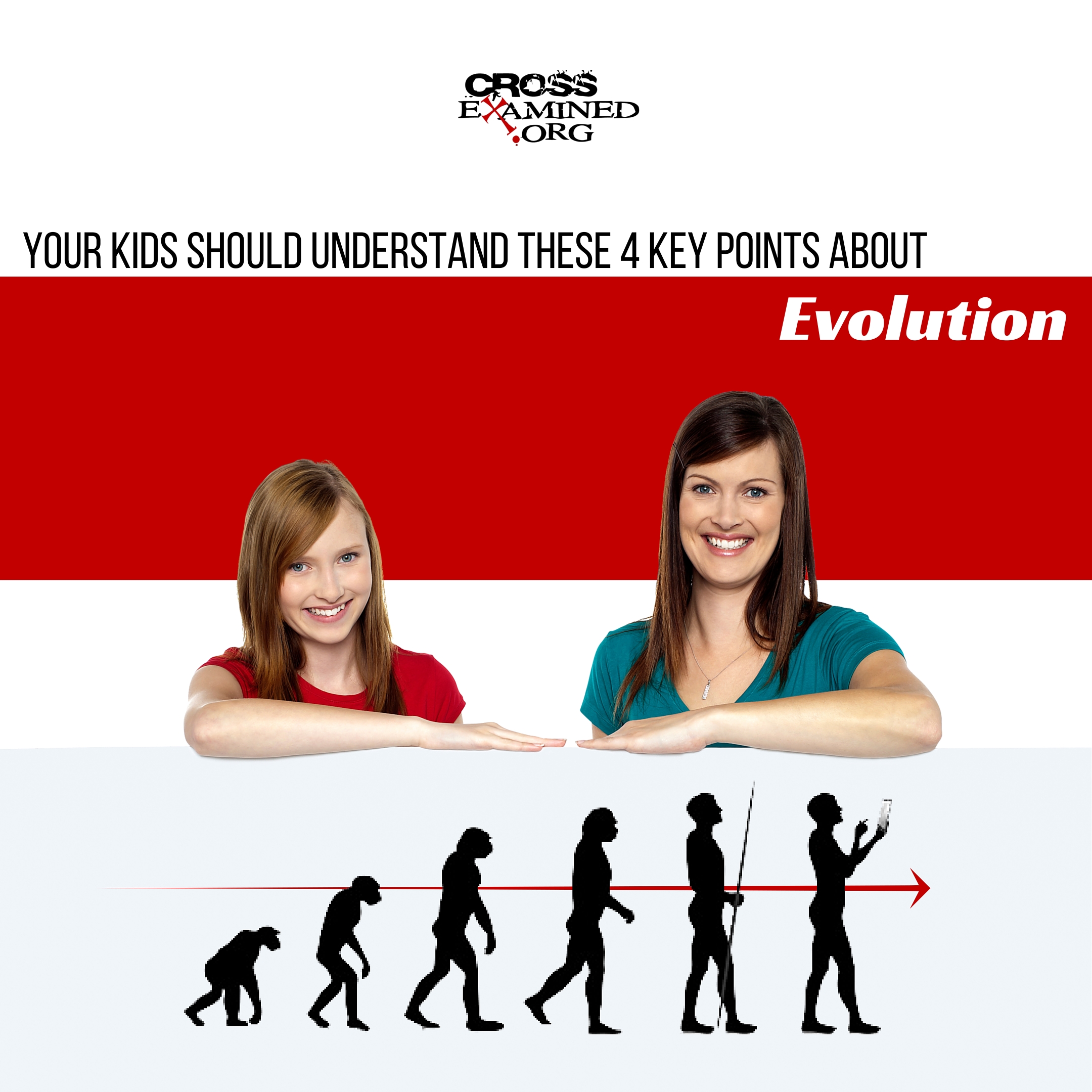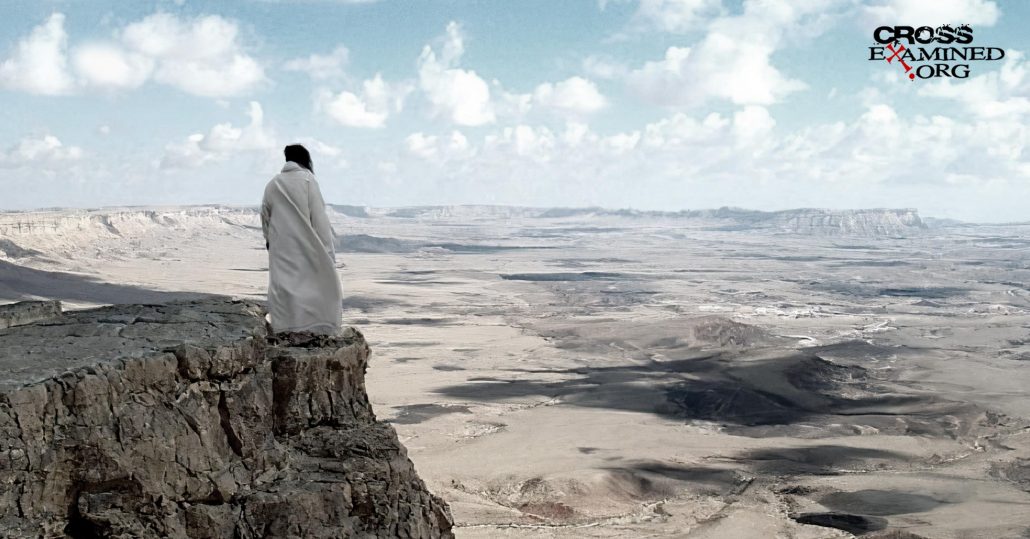4 Key Points Christian Kids Need to Understand About Evolution
The other day, I saw a post on Facebook from a mom who was concerned because her teenage daughter was turning away from God after learning about evolution. The mom was considering pulling her out of public school because she wasn’t sure what to do about it.
It breaks my heart when I see parents who feel unequipped to dialogue with their kids about evolution and age of the Earth issues. These questions are so crucial for parents to be able to discuss with their kids that I devoted 8 of the 40 questions in my book to explaining the scriptural and scientific considerations at stake.
Today I want to bring to light four key points I think Christian parents need to make sure their kids understand about evolution, but are often left unaddressed. This post could easily have been 101 things kids need to understand about evolution, but that would be another book! This is far from comprehensive, but I hope it will get the conversation going.
1. Evolution isn’t necessarily an anti-Christian concept.
A lot of Christian parents think of evolution as a dirty word. They immediately assume it’s the antithesis of Christianity and are quick to state their opposition to everything associated with it.
But the word evolution, in its most basic sense, simply means that a species has undergone genetic change over time (a species is a group of organisms capable of interbreeding—for example, humans are a species and dogs are a species). This basic concept of evolution isn’t controversial at all. Genetic change within species is a well-documented fact that scientists can observe within a human lifetime.
Christians of every viewpoint (young-Earth creationists, old-Earth creationists, and theistic evolutionists) all agree that evolution, in this sense, takes place (sometimes people refer to this as “microevolution”).
What is controversial is whether the same mechanism that drives change within a species is capable of changing one species into another (sometimes called “macroevolution”). Ultimately, evolutionists claim that all species on Earth today descend from a single species that lived 3.5 billion years ago. This is the claim most Christians object to.
When Christian parents negatively overreact to the mere idea of evolution, they can quickly lose credibility with their kids for not understanding and interacting with the issues more deeply. Our kids need us to understand what they are learning and how to process it scientifically and scripturally. If this is an area you don’t feel confident talking to your kids about, it’s important to get up to speed.
2. There is scientific evidence both consistent and inconsistent with evolutionary theory.
I didn’t hear much about evolution growing up, but I do clearly remember my youth group leader laughing it off one day: “Yeah, right, like we all really came from apes!” I chuckled along, because that thought did seem crazy.
But there were two problems with what he said. First, it wasn’t even a technically accurate representation of what evolutionists claim. Evolutionists do not claim that humans descend from modern apes, but that we share a common ancestor with them. That might sound like a fine detail, but it’s clear to me in retrospect that my leader didn’t understand evolutionary theory at all.
Second, it’s not good critical thinking to dismiss something because it sounds weird. It’s weird but true, for example, that we live on a big rock that jets around the sun and we don’t feel a thing.
Unfortunately, I have heard far too many Christians trivialize what evolution is in favor of caricatures like those of my youth pastor. When I eventually learned about the scientific evidence for evolution as an adult, my life-long faith was initially shaken in a matter of hours. No one had ever told me there was actually extensive scientific evidence that could be consistent with evolutionary claims. Based on the light-hearted handling I had seen from other Christians, I had assumed evolution was an idea that could easily be dismissed.
In reality, there is significant scientific evidence both consistent and inconsistent with evolutionary theory. Our kids need to 1) have an accurate understanding of what evolution is and 2) have a thorough understanding of the scientific evidence that is both consistent and inconsistent with it.
3. The age of the Earth and evolution are related but separate scientific subjects that Christians must grapple with.
A common misunderstanding many Christians have is that questions about the age of the Earth and evolution are all part of one issue. They’re related, but actually pose separate scientific (and theological) questions for Christians.
As a basic background, mainstream scientists estimate that the Earth is 4.5 billion years old. Young-Earth creationists estimate that the Earth is 6,000-10,000 years old, based on a timeline deduced from biblical data on historical events and genealogies. These young-Earth estimates are derived first and foremost from the biblical data, but there are young-Earth scientists who work to support those estimates with scientific evidence and models (called “creation science”). Conversely, to my knowledge, there are no mainstream scientists (Christian or non-Christian) who believe the Earth is 6,000-10,000 years old based on scientific evidence ALONE.
Here’s the bottom line.
- Evolution requires billions of years in order to even possibly have the amount of time necessary for small genetic changes to amass into the diversity of species we see today. In that sense, evolution and an ancient Earth do go hand-in-hand.
- However, the reverse is not true. An ancient Earth does not necessarily mean evolution took place. The scientific evidence for an old Earth is mostly independent from the evidence for evolution. For this reason, there are many Christians who are “old-Earth creationists”—accepting the scientific evidence for an old Earth, but rejecting evolution.
4. Theistic evolution (the belief that God used evolution to create life) has significant theological implications.
While some Christians are too fast to dismiss anything related to the word evolution (see point 1), others are too fast to embrace it without understanding the full implications. For example, I’ve heard many people say, “It doesn’t matter whether God used evolution or anything else to create the world!”
While it’s true that God could have used evolution, many people don’t realize the broadertheological implications of accepting evolution as His creative mechanism:
- The Bible states that humans are made in God’s image—a very different, morally accountable, creature than animals. If all life evolved from one common ancestor, however, we are biologically no different than animals. (Theistic evolutionists believe that the properties related to God’s “image” are those of a person’s soul, and that God could have imprinted His image on humans at an unknown point in their evolutionary development.)
- Most theistic evolutionists do not believe a literal Adam and Eve existed. If a literal first couple did not exist, the important question of how and when sin entered the world is left unanswered. Why is that so important? Well, the Bible overall is a story of the problem of sin and God’s “rescue plan” through Jesus. If you’re left without any biblical explanation of how the “big problem” arose, it can diminish the need for the “big solution” of Jesus. (Theistic evolutionists differ in how they address this.)
There are many other implications, but these are two of the most important to understand.
Biologos is the leading organization that promotes theistic evolution (they prefer the term evolutionary creation). Whether you agree with their viewpoint or not, they publish good resources for helping Christians better understand evolution.
Post edited to add: Based on multiple requests from readers of this post, I will follow up soon with a new post dedicated to providing resources for learning more about evolution and age of the Earth issues!
I’d love to hear about the experiences your kids have had with evolution in the classroom. Please share your thoughts in the comments! If there are specific subjects on this topic you’d like me to address in the future, please let me know how I can help.
Visit Natasha’s Site: ChristianMomThoughts.com













Leave a Reply
Want to join the discussion?Feel free to contribute!